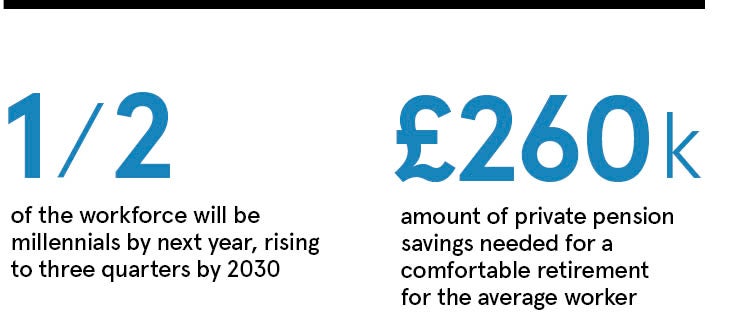Rollout of auto-enrolment over the last seven years has transformed the pensions landscape in the UK and resulted in around ten million extra people saving for their retirement by contributing through a workplace savings scheme.
While these numbers are impressive, workers are still not saving enough. According to insurer Royal London, the average person in the UK would need a pension pot of at least £260,000 to have a sufficient retirement income. This would provide an annual pension income of just over £9,000 in addition to the state pension of £8,546.20.
This amount is unlikely to be achieved by sticking, as most people do, with the minimum employee contribution required of auto-enrolment, which is currently 3 per cent and rises to 5 per cent in April. According to analysis from Fidelity International, an average male earner aged between 25 and 34 in this scenario would achieve a pot of only £142,836, while an average female earner of the same age would reach just £126,784.
The most pressing challenge was highlighted last year by a Pensions and Lifetime Savings Association study which found that more than half of workers believe the minimum contribution level of auto-enrolment is the amount government recommends to achieve enough retirement income. It’s clear that more education is crucial.
“Auto-enrolment has done a fantastic job of engaging workers in pensions again, but those minimum levels just aren’t adequate for providing a sustainable retirement,” says Duncan Watson, chief executive EQ Paymaster at Equiniti. “We need to find better ways to educate folk on the impact of taking or not taking actions. It’s about holistic wealth and benefits planning, education and training so savers have information that is easy to understand and platforms that are easy to transact on.”
The demographic that requires the most attention is the younger generation. Already the largest segment in the workforce, millennials are expected to make up half of workers by next year and around 75 per cent by 2030. A recent study by Prudential found that more than two thirds of under-35s have joined workplace pension schemes which, while lower than older demographics, defies common perceptions that millennials are unwilling to engage with longer-term saving.

In the same Prudential study, more than half of millennials said they want more education and support around pensions from their employers. This will be particularly vital in 2019 with Royal London research indicating that April’s rise in minimum contributions for auto-enrolment could cause up to a third of millennials to opt out.
“The expectations and desires of millennials and generation Z workers are very different,” says Andrew Woolnough, director of HR Solutions at Equiniti. “Savvy employers are cottoning on to the needs and desires of this growing slice of the working population and recognising that more pension guidance can have a demonstrable impact on their employees’ job satisfaction as well as their own bottom line by improving productivity, attraction and retention.”
However, the role of educating people on pensions shouldn’t only fall to employers. The government has a responsibility at multiple levels, not least because better education should alleviate stress on the welfare state and the NHS. Parents and schools have an obligation to increase financial awareness among children, while the pensions industry must catch up with other financial services in providing strong and engaging content.
This will become increasingly important as pensions become even more complicated. Millennials have replaced the “job for life” concept favoured by older generations with a preference for switching jobs every couple of years, resulting in numerous pots of funds in different places. With no “pot follows member” legislation in the UK, it is likely to fall to the pensions industry to provide the innovation required to keep track.
“The pensions dashboard championed by government is a great concept, but without compulsion it’s going to be very difficult to execute,” says Mr Watson. “The industry must evolve to allow individuals to keep track of all their pensions savings and make financial decisions from a position of strength, not make individual point decisions on just the current arrangement they are contributing to.”
For more information please visit www.equiniti.com




